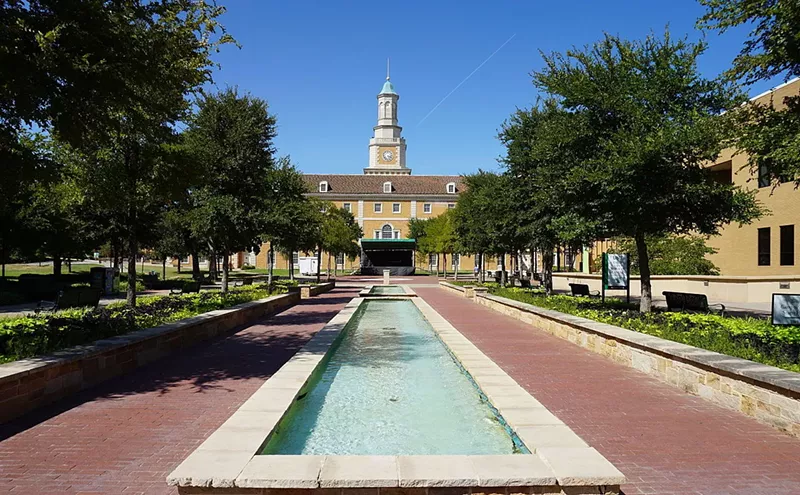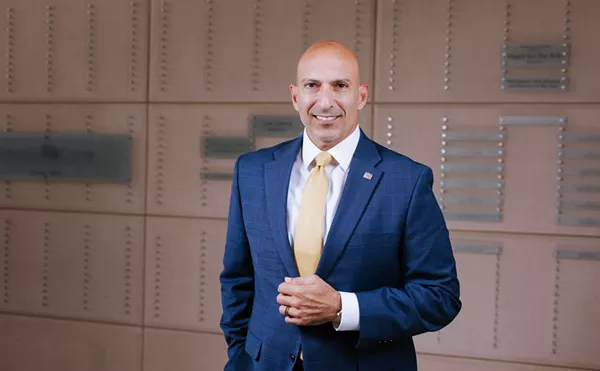In the media business, we get paid to keep up with all of this government political stuff. Other people have lives. But I am starting to see signs that the Big Thing is finally hitting home with other folks, or, as we sometimes call them in the news business, real people.
Up until this very moment, I don't think many real people understood the magnitude or the ferocity of the attack being mounted on the basic institutions of our democracy by the ultra-right.
Now they see it. And they are stunned. Maybe even frightened. I hear trembling in voices.
I saw it at a school board meeting last Thursday. Karla Rojas, mother of a student who has gone through the Dallas magnet school system, spoke from the public microphone—one of several parents making eloquent pleas on behalf of their kids, their kids' teachers, an entire school system threatened by a devastating statewide funding crisis.
She started out calm and collected, talking about the magnet schools in Dallas as a haven for smart kids—a place where smart kids can be normal and cool, where teachers know that a smart kid asks questions to satisfy curiosity, not to challenge the teacher's authority.
She had come not to bury the school system but to praise it. "Amanda has just finished auditioning for college theater and acting programs all over the United States," she said of her daughter, about to graduate from the Booker T. Washington High School for the Performing and Visual Arts.
"Seeing her stand out at these auditions really brought home to me..."
And here her voice began to give way.
"... really brought home to me how important Booker T. Washington is."
The arts magnet, along with the entire magnet school program in Dallas, is in the tumbrel, rolling over the cobblestones toward the financial guillotine. And there was not a hell of a lot anyone could tell Karla Rojas to comfort her.
The upshot of the board meeting was that no one in Dallas knows what will happen. On February 20, Dallas superintendent Michael Hinojosa presented a worst-case scenario, based on an anticipated statewide shortfall in public school funding of $10 billion, which would have entailed gutting half the faculty at Booker T.
Nobody said it at the time, but the state mandates the teaching of certain basics—those teachers can't all be fired—so that level of gutting would require the firing of all of the arts teachers who make Booker T. what it is.
At last week's meeting, Hinojosa said the shortfall may be only $5 billion. Presumably Booker T. might scrape by with a gutting of only a quarter of its faculty—still enough to break the back of the program and break the hearts of the students, parents and faculty who have come to see Booker T. as a personal partner in their destinies.
But that's only half of the picture beginning to come home for people. The other big piece of the puzzle is the face of Texas Governor Rick Perry, whose attitude toward the school funding crisis has been cocky, sneering and dismissive.
It's not just about how bad the future may be. It's also the fact that our government is in the hands of people who are glad it's all falling apart. That was their goal all along.
Last week Perry told reporters he had no responsibility for the massive teacher firings ahead in most of Texas, in spite of the fact that his so-called tax reform in 2006 is exactly what produced this crisis.
In a column published March 3, "The New Predator Class," I reminded you that former Texas Comptroller Carole Keeton Strayhorn, a Republican, predicted this crisis five years ago with eery precision.
Strayhorn looked at the amount Perry persuaded the legislature to hack from state and local property taxes in 2006. She looked at the amount Perry had promised to restore to state coffers in new business taxes. Then she took into account the fact that Perry had reneged on that deal and failed to raise the promised business taxes.
Strayhorn couldn't have foreseen the 2007-2008 Wall Street meltdown. She estimated that our shortfall in state revenues in 2011 would be $23 billion.
This is 2011. The shortfall is $27 billion.
But last week, speaking in a sneering cocky tone, Perry told reporters that neither he nor anyone else in Austin was responsible: "The lieutenant governor, the speaker and their colleagues are not going to hire or fire one teacher, as best as I can tell," he said.
Perry suggested school districts cut something other than teachers—pandering to Tea Party dogma that all of the money is stolen anyway by bureaucratic grifters and cheats.
But in Dallas, 87 percent of the general fund budget is in money paid to campus personnel. The suggestion that it can be cut elsewhere is a callous shrug.
This is what's coming home: For Rick Perry and the people he represents, public education itself is worthless. It needs to come down. It needs to be devastated.
Next they will go after Medicare. Social Security. Even private pensions. Certainly collective bargaining. These are people who intend to turn to the American middle ground of society and kick its ass. And they're pretty far along.
A major element in their ability to get this far has been the aura of inevitability they have been able to weave around themselves, with major assists from the Fox Television Network and from right-wing radio.
I'm not dismissing the results of the midterm congressional elections, in which the voters of the country seemed to give a notable thumbs-up to the Tea Party. But I am saying the overall true picture is a hell of a lot more complicated than a Tea Party Future for America.
Take Fox News, for example. They push a relentless narrative in which Obama-hating Americans can't wait to make Sarah Palin the next president, get rid of national healthcare reform, snatch away collective bargaining rights from public employees and bust existing contractual pension obligations.
Then we have the Rick Perry narrative in Texas. Rather than giving a damn that public education may be destroyed in Texas, Perry tells us what we really care about is sending all the Mexicans back to Mexico or wherever Mexicans come from. Next big agenda item: requiring the state to stick a tube up the vagina of any woman who wants an abortion and then forcing her to watch a movie of her fetus. Perry is Fox News times 10.
But there is a silver lining in all of this. The Fox scenario is a lie. We are not a Thorazine Nation, crazed by misanthropic greed, bigotry, xenophobia and a lust for feudalism. Hey. This is still America.
We're a good country.
Thanks to an old colleague, Robert Cay Johnston, I learned a neat trick last week. I read something Johnston wrote about Fox News, and I tried it myself. If you go to the web page where Fox publishes its public opinion stories (Google "Fox News Polls"), you need to click on a specific story and then click again on a link usually called, "Click here to view the raw data."
Fox pays professional pollsters to do its polling. The overall narrative painted in the raw data those pollsters produce paints a scenario 180 degrees opposed to the one relentlessly flogged by Fox on-air personalities.
A majority of us approve of the way President Obama has done his job so far, according to Fox's own data. If he were to run against Sarah Palin right now, we would vote for him and against her by a crushing two-to-one ratio.
We disapprove of what's going on in Congress right now by a ratio of two-to-one. Guess how many of us want Congress to focus on undoing healthcare reform. Fifteen percent. Guess what we do want Congress to focus on. Jobs.
Look, if these were just Fox polls, I probably wouldn't believe even the raw data. But the picture is the same in a broad array of polls. A recent Bloomberg poll found that 63 percent of us believe it is wrong for states to violate their pension obligations to public employees.
Fully 64 percent of us, including a plurality of Republicans, believe public employees should have the right to bargain collectively, according to the Bloomberg poll.
In fact, the larger picture on all of these issues echoes something I found several months ago when I was working on a story about immigration reform. The vast majority of Americans still occupy a reasonable and moderate center ground.
We don't want to round up Mexican families and ship them off in a bad scene from the Bible. We don't want to take a meat-axe to contractual pension obligations. We don't want to throw old people and babies into the street because they're sick or poor or weak.
But our problem is that all of those things are beginning to happen, anyway. In spite of us. This business with the schools reminds me of the immigration issue in another way. I talked to immigration experts and activists all over the country, and they all had masses of polling data to support moderate, intelligent approaches to difficult problems.
But then I could hear them turning toward Congress in Washington, where immigration issues are captive to extremists, or, worse yet, turning toward the Legislature in Austin, which is beginning to resemble Italy in the 1930s.
And I heard this stunned catch in the voice, a dark astonishment, as if to say, "Where did this come from? How did this happen? Can we do anything to stop it?"
Of course we can. This is the same country it was after World War II, at heart. We're all still here. But we have to know this moment. This is the moment when it's time to stop being stunned. This is when we leap.












